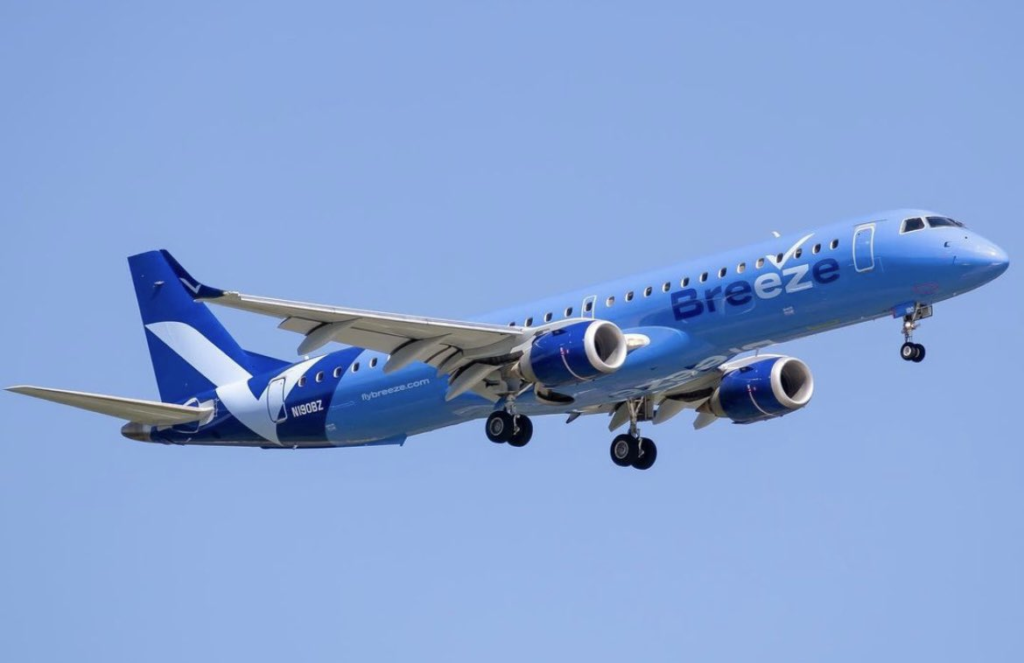(GRAND JUNCTION) Breeze Airways Flight 704 from Norfolk to Los Angeles made an emergency diversion to Grand Junction, Colorado, on August 13, 2025, after a severely unruly passenger twice broke free from restraints and threatened people on board, authorities said. The Airbus A220 landed safely at about 11:15 a.m. local time, and police, acting with federal agents, took a 46-year-old man into custody. The Federal Aviation Administration said the case adds to just over 1,000 unruly passenger reports this year, a total that has fallen since the pandemic peak but still worries safety officials.
Authorities identified the passenger as David Leroy Carter Jr., 46, who was described as intoxicated, waving a skateboard, yelling racist slurs, and fighting with travelers and crew before the diversion to Grand Junction. According to Breeze Airways, one passenger and one flight attendant had minor injuries and were checked after landing; police later said no formal injury reports were filed.

Diversion to Colorado and arrest details
Flight 704 departed Norfolk at 9:17 a.m. Eastern and was scheduled to reach Los Angeles around noon. About three hours into the trip, the crew decided to divert after the disturbance escalated, and the jet touched down in Grand Junction at roughly 11:15 a.m. local time.
Grand Junction Police said they boarded at the gate and, acting at the direction of the FBI, arrested Carter and took him to the Mesa County Detention Facility. The FAA opened an investigation alongside the FBI, standard practice when a flight diverts because of violent behavior.
On board, witnesses described a chaotic scene: Carter reportedly swung a skateboard, shouted slurs, and fought with people nearby. Passengers and crew tried to restrain him twice; both attempts failed, and at one point he used the restraint device itself as a weapon, according to passenger accounts.
A flight attendant called for help, and several travelers stepped in — including one passenger described as the “linebacker in 17C,” who helped hold Carter down until landing. Breeze Airways confirmed the diversion and said law enforcement met the aircraft; the airline did not issue further details while the federal review continues.
Because of the stop in Colorado and the subsequent investigation, the flight reached Los Angeles about seven hours late, arriving shortly after 7 p.m. instead of noon.
Policy context and enforcement
The FAA says airlines have reported just over 1,000 unruly passenger incidents in 2025, far below the nearly 6,000 cases logged in 2021 but still above pre‑pandemic levels that regulators consider acceptable for routine safety.
Officials kept the federal zero-tolerance approach in place this year, with potential civil fines of up to $37,000 per violation and possible criminal prosecution. Procedures for crews are clear:
- Attempt to calm and restrain the person.
- Divert if safety is at risk.
- Alert law enforcement and federal authorities on arrival.
The FAA’s public page on unruly passengers details penalties, reporting, and advice for travelers and airlines; readers can review current guidance at https://www.faa.gov/passengers/unruly-passengers.
Impact, responses, and broader debate
According to analysis by VisaVerge.com, the downward trend since the 2021 spike has not removed risks to crews or passengers. Diversions like the one affecting Flight 704 underscore why enforcement remains strict.
Key takeaways for passengers and industry:
- Community action on board can matter, but officials stress passengers should step in only when a crew member asks and when someone’s safety is at stake.
- Airlines, including Breeze Airways, say they have stepped up training in de‑escalation and restraint and encourage quick reporting so pilots can choose to divert early if needed.
- Civil liberties groups sometimes question how restraints are used and call for clear limits and review.
- Passenger advocates urge better support for crews and travelers shaken by such events.
Industry groups continue to debate better restraint tools after incidents where people break free — as happened twice on this flight — raising questions about equipment strength and crew positioning during crises.
Local effects and next steps in the investigation
In Grand Junction, police noted the investigation is ongoing; as of August 14, Carter remained in custody at the Mesa County Detention Facility. Breeze Airways has not released a detailed statement beyond confirming the diversion and law enforcement response, while the FBI and FAA said investigations remained active as of August 14, with findings to be shared when available.
Officials have not released further details about potential charges, and the FBI and FAA inquiries continue. Typical next steps include:
- Interviews with crew and passengers
- Review of available video and evidence
- Decisions on penalties or possible criminal charges
Even when injuries are minor, the emotional strain can be real for those on board, and arrival times can slip by many hours, as they did here. Diversions also place unexpected pressure on local agencies and airport staff.
Passengers on Flight 704 who spoke with reporters said they were grateful for the fast landing in Colorado, and several praised the calm tone of the flight attendants during the struggle. Air travel depends on trust that crews can keep cabins safe, and events like the one in Grand Junction test that trust even as overall incident numbers fall.
Federal investigators are expected to report findings in the coming weeks; any recommendations on tools, training, or penalties will carry weight across all carriers, including Breeze Airways.
This Article in a Nutshell
Flight 704 diverted to Grand Junction on August 13, 2025 after a drunk passenger broke restraints and threatened others; authorities arrested David Leroy Carter Jr., investigations by FBI and FAA continue while passengers and crew recover from a chaotic, delayed journey that arrived seven hours late in Los Angeles.













